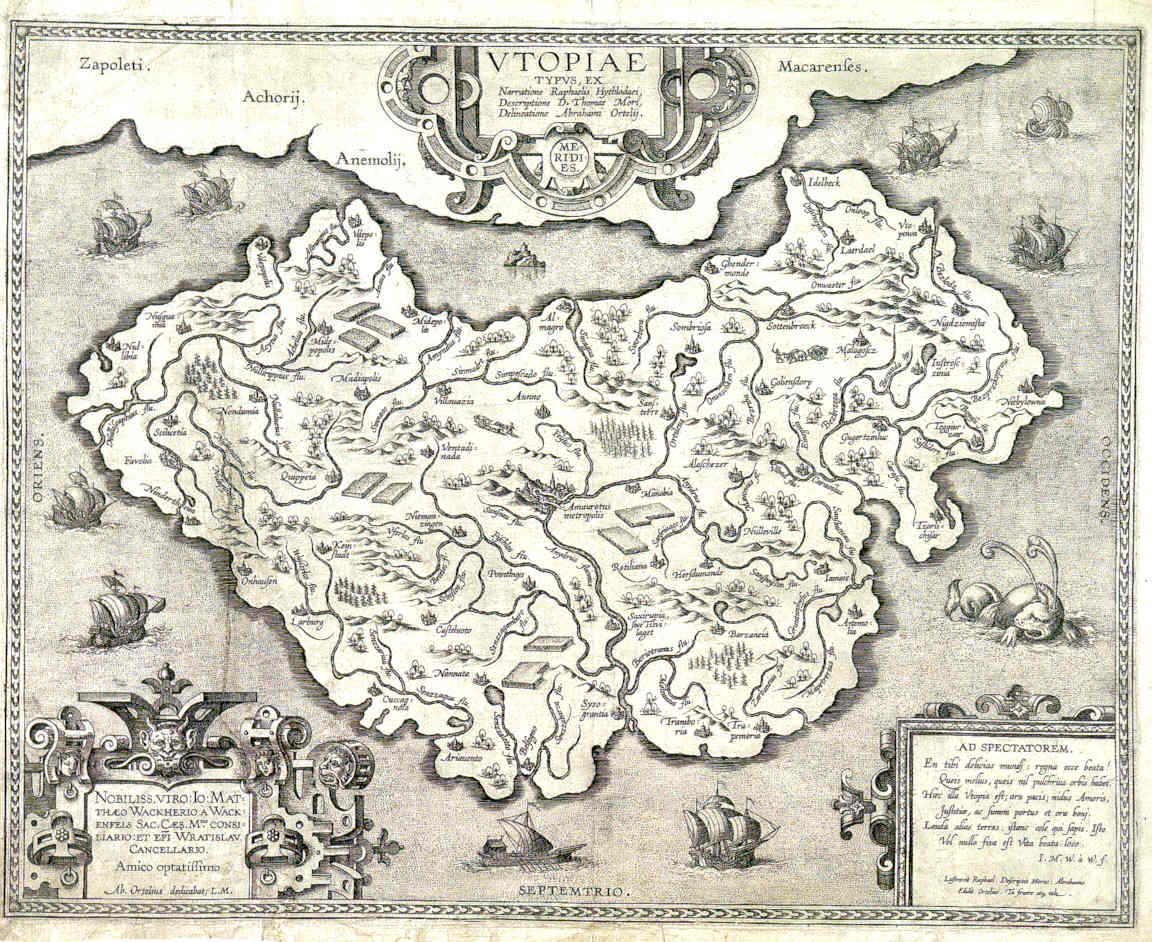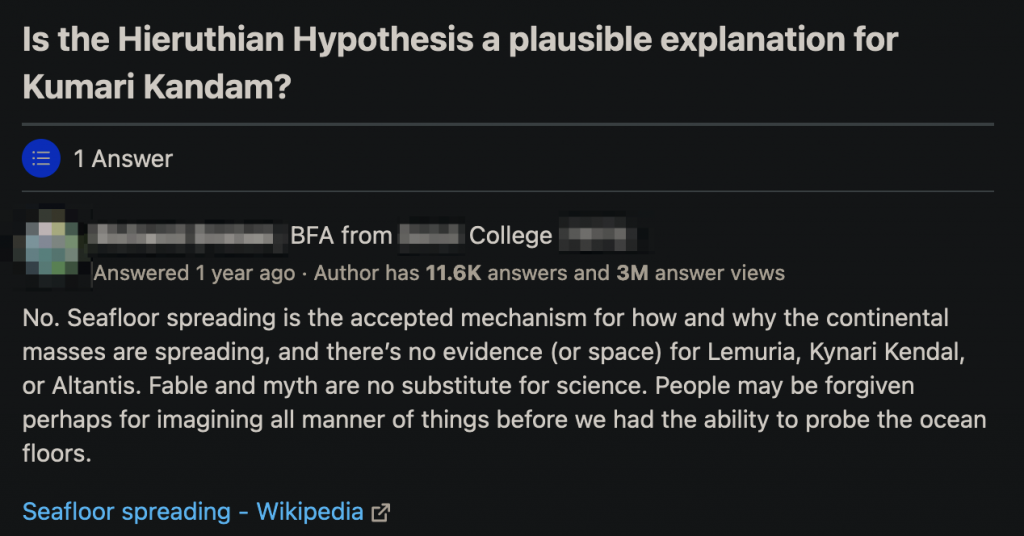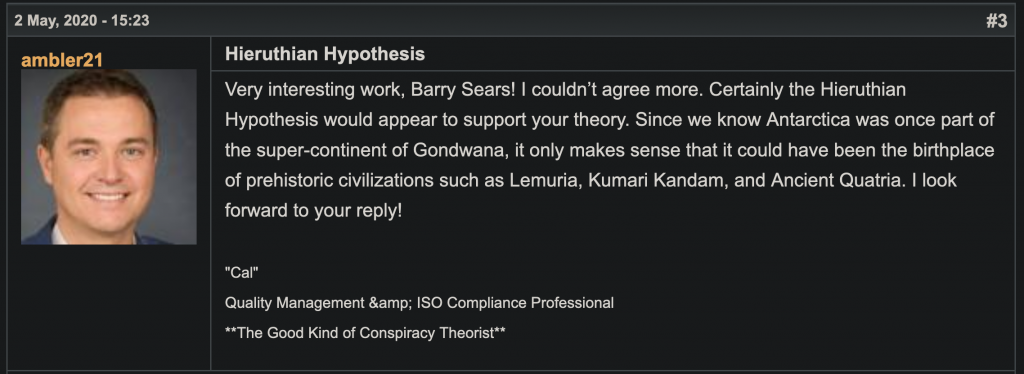In working backwards through classics of Utopian literature, especially satires, I started with Erewhon (enjoyed it), did Gulliver’s Travels (LOVED it!), and now onto a collection called Three Early Modern Utopias put out by Oxford Classics (which does excellent print editions if you’re looking for old books).

Almost finished with Thomas More’s Book One of Utopia. I have to admit, that first book is extremely slow and boring. And we don’t even get the punchy Effect of capitalizing Nouns we get in Swift. It’s just like weird archaic language with basically no story, leading up to discussion of the actual (not actual) island called Utopia. The first book is kind of a Mirrors for Princes genre-piece. Honestly, I was expecting both Erewhon and Gulliver to be boring like this, but they totally weren’t (at least not after the narrator arrives in Erewhon proper, it’s a little slow up to that).
Anyway, there’s a lot to probably say about this book, so I started skimming Wikipedia to help ground me in what the hell is actually being said as I finish up Book One.
“There is no private property on Utopia, with goods being stored in warehouses and people requesting what they need. There are also no locks on the doors of the houses, and the houses are rotated between the citizens every ten years.”
This business about requesting what they need from warehouses strikes me as weirdly similar to modern-day use of Amazon to fulfill one’s daily needs. Now, okay, we still “own” the goods we get in exchange for money, but there’s something here. If only of a thematic, sci-fi connecting tangent…
For the past few years in my writing, I’ve on and off again visited a possible (probable) future where climate catastrophe is global, national governments tumble, and a few “brave” (dystopian) corporations step in to pick up the pieces. These become the “Four Providers,” as I’ve called them. In a sort of neo-feudalism, people are pledged to one or another Provider, or they may be a classless class apart, the “Without Providers,” who are denied basic services, and must make their own way in an increasingly hostile climate and society.
These Providers, for the most part, are sentient or quasi-sentient general artificial super-intelligences. I haven’t settled on any final name for them, calling them sometimes Sages (depending on their aligment), sometimes Princeps, and other times other things. Though they range from malevolent/chaotic to friendly and beneficial (for the most part) to humans, they in effect play the part of super-intelligent philosopher kings, or medieval princes of enclaved city-states, or collections of city-states. Though some places may also be mixed polities, where those covered by different Providers live and interact with one another.
More’s Utopia, of course, is not that. But it is many other interesting things, some good-sounding and some bad-sounding. Some other Wikipedia quotes:
Agriculture provides the most important occupation on the island. Every person is taught it and must live in the countryside, farming for two years at a time, with women doing the same work as men. Parallel to this, every citizen must learn at least one of the other essential trades: weaving (mainly done by the women), carpentry, metalsmithing and masonry. There is deliberate simplicity about these trades; for instance, all people wear the same types of simple clothes and there are no dressmakers making fine apparel. All able-bodied citizens must work; thus unemployment is eradicated, and the length of the working day can be minimized: the people only have to work six hours a day (although many willingly work for longer). More does allow scholars in his society to become the ruling officials or priests, people picked during their primary education for their ability to learn. All other citizens, however, are encouraged to apply themselves to learning in their leisure time.
Slavery is a feature of Utopian life and it is reported that every household has two slaves. The slaves are either from other countries (prisoners of war, people condemned to die, or poor people) or are the Utopian criminals. These criminals are weighed down with chains made out of gold. The gold is part of the community wealth of the country, and fettering criminals with it or using it for shameful things like chamber pots gives the citizens a healthy dislike of it. It also makes it difficult to steal as it is in plain view. The wealth, though, is of little importance and is only good for buying commodities from foreign nations or bribing these nations to fight each other. Slaves are periodically released for good behaviour. Jewels are worn by children, who finally give them up as they mature.
Other significant innovations of Utopia include: a welfare state with free hospitals, euthanasia permissible by the state, priests being allowed to marry, divorce permitted, premarital sex punished by a lifetime of enforced celibacy and adultery being punished by enslavement. Meals are taken in community dining halls and the job of feeding the population is given to a different household in turn. Although all are fed the same, Raphael explains that the old and the administrators are given the best of the food. Travel on the island is only permitted with an internal passport and any people found without a passport are, on a first occasion, returned in disgrace, but after a second offence they are placed in slavery. In addition, there are no lawyers and the law is made deliberately simple, as all should understand it and not leave people in any doubt of what is right and wrong.
That last piece sounds almost like Swift’s talking horses, Houyhnhnms, who are highly rational creatures, so much so that he wishes he could stay with them, and when banished, is hard-pressed to re-adjust to the grossness of human society which he’d learned to hate. I believe he says something to the effect that they are governed by “reason alone” and as a consequence have no need for anything other than very simple laws. With the unlikely idea, obviously, that reason when employed by differing parties (with different interests and contexts) will always operate toward the same ends. Anyone who has lived anywhere on actual-not-fictional-planet-earth knows that is not the case.
And that, of course, is the “fun” of Utopian literature. Being able to bend & blend reality and imagination like that. Utopian lit is 100% hyperreal. It opens up an imaginal space which almost seems like it could become a real space in certain times & circumstances. We want to believe it could be true, even if – and possibly because – so much of it is so absurd. It’s part of why I’ve recently started feeling (for whatever my feelings are worth or not worth) that satire, especially, is one of the highest forms of art.
Maybe/probably that’s just something that satirists tend to end up thinking about themselves, because you have to be kind of an asshole to be a satirist in the first place. But I also think like, there’s no kind of commentary you can make with a serious face that ends up – for my money, anyway – being as powerful as the cutting kind that accompanies satire. And there is no kind of true expression that you might find in non-satirical art that is quite as True-Capital-T as that which you find between the tongue and the cheek of satire. In the liminal space of satire can be great power, great pain, great beauty, and great despair, all in the same moment.
Which makes this bit from the Wikipedia interesting about More’s flirtations with Utopian socialism:
“Book two has Hythloday tell his interlocutors about Utopia, where he has lived for five years, with the aim of convincing them about its superior state of affairs. Utopia turns out to be a socialist state. Interpretations about this important part of the book vary. Gilbert notes that while some experts believe that More supports socialism, others believe that he shows how socialism is impractical. The former would argue that More used book two to show how socialism would work in practice. Individual cities are run by privately elected princes and families are made up of ten to sixteen adults living in a single household. It is unknown if More truly believed in socialism, or if he printed Utopia as a way to show that true socialism was impractical (Gilbert). More printed many writings involving socialism, some seemingly in defense of the practices, and others seemingly scathing satires against it. Some scholars believe that More uses this structure to show the perspective of something as an idea against something put into practice. Hythloday describes the city as perfect and ideal. He believes the society thrives and is perfect. As such, he is used to represent the more fanatic socialists and radical reformists of his day. When More arrives he describes the social and cultural norms put into practice, citing a city thriving and idealistic. While some believe this is More’s ideal society, some believe the book’s title, which translates to “Nowhere” from Greek, is a way to describe that the practices used in Utopia are impractical and could not be used in a modern world successfully (Gilbert). Either way, Utopia has become one of the most talked about works both in defense of socialism and against it.”
I don’t especially have a horse in this race, though after becoming a Canadian citizen, can see that socialized medicine is “actually pretty cool if you think about it.” It sort of takes away the essential terrible existential fear of financial ruin over health problems many/most live with in the United States (and elsewhere). If you need help, you just have to call, basically. But if Quebec’s health system is indicative of the whole, you have to then wait a very very long time. So that part sucks. Like anything, you can make arguments for and against it. And I think that in a nutshell (to make arguments for and against and to lampoon both), is the purpose of utopias, satires, and especially Utopian satires as a genre, like I’m attempting to do myself after that grand style in Conspiratopia.







